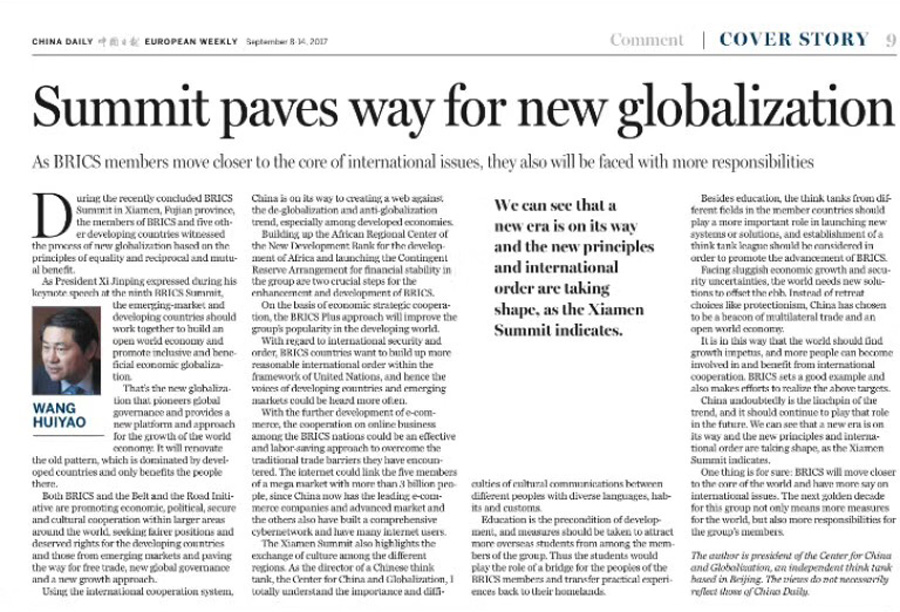Wang Huiyao: Summit paves way for new globalization
September 11 , 2017

As BRICS members move closer to the core of international issues, they also will be faced with more responsibilities
During the recently concluded BRICS Summit in Xiamen, Fujian province, the members of BRICS and five other developing countries witnessed the process of new globalization based on the principles of equality and reciprocal and mutual benefit.
As President Xi Jinping expressed during his keynote speech at the ninth BRICS Summit, the emerging-market and developing countries should work together to build an open world economy and promote inclusive and beneficial economic globalization.
That’s the new globalization that pioneers global governance and provides a new platform and approach for the growth of the world economy. It will renovate the old pattern, which is dominated by developed countries and only benefits the people there.
Both BRICS and the Belt and the Road Initiative are promoting economic, political, secure and cultural cooperation within larger areas around the world, seeking fairer positions and deserved rights for the developing countries and those from emerging markets and paving the way for free trade, new global governance and a new growth approach.
Using the international cooperation system, China is on its way to creating a web against the de-globalization and anti-globalization trend, especially among developed economies.
Building up the African Regional Center of the New Development Bank for the development of Africa and launching the Contingent Reserve Arrangement for financial stability in the group are two crucial steps for the enhancement and development of BRICS.
On the basis of economic strategic cooperation, the BRICS Plus approach will improve the group’s popularity in the developing world.
With regard to international security and order, BRICS countries want to build up more reasonable international order within the framework of United Nations, and hence the voices of developing countries and emerging markets could be heard more often.
With the further development of e-commerce, the cooperation on online business among the BRICS nations could be an effective and labor-saving approach to overcome the traditional trade barriers they have encountered. The internet could link the five members of a mega market with more than 3 billion people, since China now has the leading e-commerce companies and advanced market and the others also have built a comprehensive cybernetwork and have many internet users.
The Xiamen Summit also highlights the exchange of culture among the different regions. As the director of a Chinese think tank, the Center for China and Globalization, I totally understand the importance and difficulties of cultural communications between different peoples with diverse languages, habits and customs.
Education is the precondition of development, and measures should be taken to attract more overseas students from among the members of the group. Thus the students would play the role of a bridge for the peoples of the BRICS members and transfer practical experiences back to their homelands.
Besides education, the think tanks from different fields in the member countries should play a more important role in launching new systems or solutions, and establishment of a think tank league should be considered in order to promote the advancement of BRICS.
Facing sluggish economic growth and security uncertainties, the world needs new solutions to offset the ebb. Instead of retreat choices like protectionism, China has chosen to be a beacon of multilateral trade and an open world economy.
It is in this way that the world should find growth impetus, and more people can become involved in and benefit from international cooperation. BRICS sets a good example and also makes efforts to realize the above targets.
China undoubtedly is the linchpin of the trend, and it should continue to play that role in the future. We can see that a new era is on its way and the new principles and international order are taking shape, as the Xiamen Summit indicates.
One thing is for sure: BRICS will move closer to the core of the world and have more say on international issues. The next golden decade for this group not only means more measures for the world, but also more responsibilities for the group’s members.
Topical News See more






